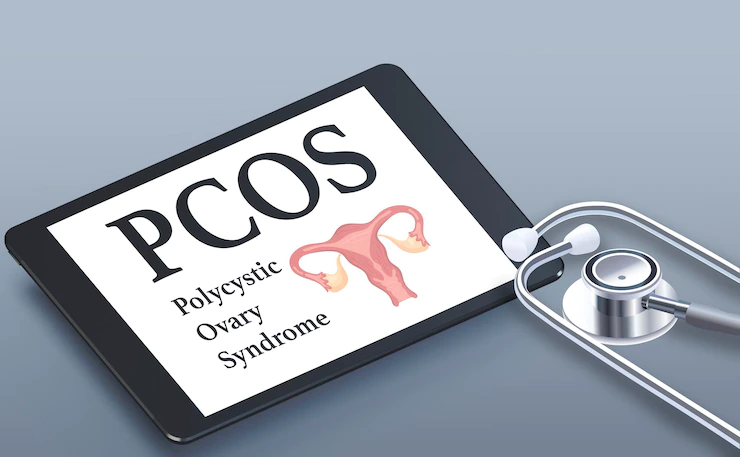The world of women has been shocked by PCOD (Polycystic Ovarian Disease) or PCOS (Polycystic Ovarian Syndrome). Currently, it affects a significant portion of young women in India. Since PCOD typically manifests in childhood, many young adults struggle with this issue. About 5–10% of women of reproductive age are affected by this frequent endocrine condition, which has an unclear cause. PCOD typically affects people between the ages of 18 and 45. It is crucial that young people comprehend this illness at its inception, as well as its origins and potential long-term effects.
The hormonal disorder polycystic ovarian disease (PCOD) causes the ovaries to generate an excessive number of immature or partially mature eggs, which over time develop into cysts. The resultant enlargement of the ovaries and excessive androgen secretion leads to irregular menstrual cycles, infertility, weight gain, excessive body hair, acne, and hair loss. Women do contain modest quantities of androgens. PCOD cannot be cured, but it can be managed with a change in lifestyle.
A metabolic condition called Polycystic Ovary Syndrome (PCOS) can lead to anovulation, in which the ovaries stop producing eggs. Similar to PCOD, women with PCOS have high amounts of androgens, or male hormones, which result in missed or irregular periods and infertility. In fact, PCOS is one of the most often occurring factors in female infertility. Unwanted hair is growing on my face and torso. It’s a significant health condition that, if addressed, can lead to diabetes and heart problems.
Symptoms of PCOD
Typically, symptoms begin to appear during the first menstrual cycle. The following are typical PCOD/PCOS signs and symptoms:
- Excessive body hair, especially on the back, chest, and stomach
- Acne on the upper back, chest, and face
- Missed, delayed, occasional, or irregular menstrual periods
- Excessive hair thinning or hair loss (male pattern baldness)
- Adding weight
- Darkening of the skin, especially in the neck, groin, and area beneath the breasts
- Skin tags, or tiny protrusions of extra skin, under the armpits or neck
Causes for PCOS
Although the precise cause of PCOS is unknown, the following factors are thought to contribute to it:
- Excess androgen: Male hormones called androgens. Although they are present in all women, those with PCOS have excessively high levels.
- Excess insulin: When your body develops an insulin resistance, it can’t utilise insulin as it should. As a result, the body’s insulin levels rise, and the extra insulin it generates turns into androgens, making ovulation challenging.
- Hereditary factors: PCOS may run in families. If one or more members of one’s direct family have PCOS, there is a 50% chance that one will as well.
- Low-grade inflammation: Women with PCOS experience low-grade inflammation, which prompts the release of more androgens from the ovaries. Heart or blood vascular issues may result from this.
Complications
Numerous issues, including trouble conceiving and a higher risk of type 2 diabetes developing early, can arise from uncontrolled PCOD. Pregnancy-related problems such gestational diabetes and pre-eclampsia are more likely to occur in patients with PCOS. Additionally, they are more likely to develop endometrial cancer in the long run. Other issues include be elevated cholesterol, high blood pressure, or even breast cancer.
PCOD or PCOS diagnosis
No single test can diagnose a condition. Your doctor will inquire about your medical history and suggest several tests based on the symptoms, such as irregular periods, unwelcome hair growth, etc. Your reproductive organs may be examined via the pelvis to look for any anomalies. Blood tests may be advised to check your cholesterol, blood sugar, and hormone levels. The size of the ovaries, ovarian cysts, and uterine lining can all be examined using imaging tests like ultrasound.
Treatment of PCOD
There is still no known treatment for PCOD. The condition must be managed with a change in lifestyle. Additionally, a multidisciplinary strategy involving a dietician, gynecologist, endocrinologist, dermatology, and infertility specialist is required.
Maintaining adequate weight management is the greatest strategy to regulate and manage PCOD. Even a 5% weight loss can make a significant difference in the disease’s treatment. Patients with PCOD must therefore engage in frequent exercise and eat healthily. The diet should contain little carbohydrates and sweets. For people with PCOD, high protein and high fiber diets are advised.
Based on the symptoms, the rest of the treatment can be carried out. The various modalities are as follows:
- There are medications for menstrual cycle correction, insulin resistance treatment, and hormone balancing.
- Acne, pigmentation, and hair growth can all be treated using skin care products.
- Patients who are infertile receive fertility medications.
- For the purpose of increasing fertility, oral medications and injections are offered to induce ovulation and rupture eggs.
- In some circumstances, second-line therapy may be necessary, such as ovarian drilling, laparoscopic surgery, or aromatase inhibitors.
- PCOS is typically intensively treated in people who are eager to get pregnant. Metformin and hormone therapy are used to treat insulin resistance and period irregularities in adolescent patients.
It should be highlighted that without appropriate lifestyle modifications, no drug or form of treatment will be effective.
During pregnancy, PCOD
As long as PCOD is under control, getting pregnant is not a problem. However, infertility specialists believe that inadequate illness control might necessitate drugs or assisted reproductive technology (ART).
To produce healthy eggs, women with PCOD have a limited ovarian capacity, which should be taken into consideration. Therefore, if they desire children, they are encouraged to choose an early pregnancy as getting older has a negative impact on the quality of the eggs. It is usually important to address the symptoms with a gynecologist. To diagnose the condition and establish a treatment plan, the doctor could prescribe certain tests, such as the PCOD Panel test.

